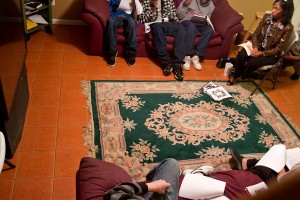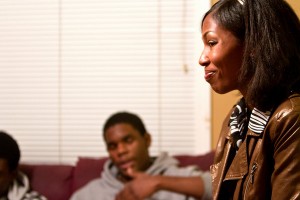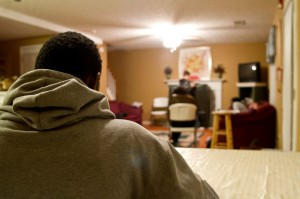“I smoke a blunt to take the pain out and if I wasn't high, I'd probably try to blow my brains out.” The lyric from a Tupac Shakur song may seem racy for young ears, but one local therapist encourages some teens to listen closely. She says rappers like Jay-z, Notorious B.I.G. and even Atlanta’s own T.I. and Ludacris are teachers whose life stories can help young people learn from their own mistakes and heal.
H.Y.P.E. hip-hop therapy is the brainchild of Stone Mountain-based mental health counselor Dr. Adia Winfrey. “Dr. Dia,” as her clients call her, is a lifelong hip-hop fan who incorporates rap music into group counseling sessions in hopes of getting troubled teens to open up. H.Y.P.E. is an acronym for Healing Young People Thru Empowerment.
Watch our H.Y.P.E video report, a collaborative effort with 90.1 FM WABE, Atlanta's National Public Radio affiliate.
For tonight’s session, five teenage boys dressed in jeans and sneakers are sprinkled around the living room of a home just off a cul de sac in a middle class Lithonia neighborhood. They’ve all gotten into trouble with the law and must live together in a group home until a judge says they can go home. They come here once a week for counseling.
They begin with the “H.Y.P.E. Creed,” affirmations that are as much a pledge of self-love as they are a promise to uphold the founding principles of hip-hop; creativity, community and camaraderie. One boy leads, while the rest follow along with a booklet.
“I believe in myself. I will accomplish my goals. I know that I have gifts and it is my job to share those gifts; with my family, with my community and with the world. I will remain true to the hip-hop culture.”
The creed continues: “I am learning that we all make mistakes. And it is my responsibility to learn from my mistakes.” 
In the beginning some listen politely or stare straight ahead, while others look away completely disengaged. The discussion continues, but the energy level in the room gets, well, more hyped once the music starts. The teens bob their heads and some even gesture and mouth the lyrics as the beats pulsate through Winfrey’s iPod speakers. They follow along with printed lyrics. Then it’s time to talk. Fifteen year-old John* has a lot to say about the song Pressure by rapper Sheek Louch.
“What stood out to me was how he said the streets pressure him,” he says. “You might try to do right but it seems like when you’re falling down the streets are there. So you go to the streets for like a crutch. It’s pressuring him to do stuff. Like if I [were to] walk in here with a gun you might try to do right and walk off but you know if you walk out you’re not trying to look like a punk in front of everybody. So you’re probably going to grab your [gun] and [we’ll] both [be] just shooting at each other.”
 While working on her doctorate degree in clinical psychology at Wright State University in Dayton Ohio, Winfrey developed H.Y.P.E. primarily as a tool to help young black males open up in therapy sessions. The music, she says, is a major motivator.
While working on her doctorate degree in clinical psychology at Wright State University in Dayton Ohio, Winfrey developed H.Y.P.E. primarily as a tool to help young black males open up in therapy sessions. The music, she says, is a major motivator.
“I can ask a youth who’s clearly depressed, ‘what’s going on?’ and they’re like ‘I’m all good,’” says Winfrey. “Then I play [the song] Lord Knows by Tupac. [By the time] the song goes off they’re telling me about when they had a gun to their head; or they’re telling me about how they were just feeling suicidal.”
Winfrey says the music seems to “make it okay” for young people to open up. “These masculine [rappers] are talking about these things so 'it’s okay for me to feel this,'” she says, of her clients. “I’m not less of a man. I’m not a punk. This is real life stuff that people go through. So it kind of just breaks that ice and starts breaking down these stereotypes that a lot of people have.”
To her point, tonight’s session especially resonates with 15-year-old attendee Chris*, a Hurricane Katrina transplant from New Orleans and a new father to a baby boy. Chris admits he’s struggling to turn away from street life. H.Y.P.E., he says, helps. 
“I was in a gang and while I’m locked up I still care about that gang,” he says. “It’s basically like a family thing because my daddy was in a gang and I’m in a gang. My daddy don’t bang no more. For me it’s kind of hard to give it up because I’m used to making the money and everything; driving the cars, the clothes, the balling you know. But now I see that I don’t need no gang banging just to show somebody that I can do this or do that. I don’t need the gang banging no more.”
Although he’s resolved to leaving the gang, getting out, he says, is not so simple.
“I’m saying I’m giving it up, but I know when I get home and I tell my homies I gave it up I’m going to have to be ready for the consequences,” he says.
Chris and John say with Dr. Winfrey’s help they’re learning to better manage their emotions. Now situations that would have typically erupted into a fight, fizzle. Instead of letting emotions overtake them, now they retreat to the bedroom they share at the group home and write raps. 
“That’s what I like to do with my raps when I get mad at people, I like to write them down,” says Chris. “I might write something negative about that person but a good song might come out of the situation. And I might be like ‘well I know I can express this in music.’ I’m expressing my feelings and I’m getting out what I need to get out and everything.”
John agrees: “I just know hip-hop is like [a] powerful tool to express your feelings and how you feel every day.”
Dr. Winfrey says their progress is a sign that there’s hope in H.Y.P.E.
“My goal at the end is to have kids be aware of the power that they have over their behavior; the fact that they have a voice, that’s like my big thing,” she says. “ We all are conditioned to walk the line and not break the mold too much when in actuality to really make it in life you have to have a voice and be able to speak up for yourself. H.Y.P.E. – it’s hip-hop therapy [and] hip-hop psychology, but it’s more than that, it’s hip-hop empowerment.” *Names have been changed to protect identity.
___________________________
Got a juvenile justice story idea? Contact JJIE.org staff writer Chandra R. Thomas at cthom141@kennesaw.edu. Thomas, a former Rosalynn Carter Mental Health Journalism Fellow and Kiplinger Public Affairs Journalism Fellow, is an award-winning multimedia journalist who has worked for Fox 5 News in Atlanta and Atlanta, People and Essence magazines.

What to learn what others are also doing in the Hip-Hop therapy field? See this post at Reclaiming Futures: http://blog.reclaimingfutures.org/node/1468
Do you know other examples?